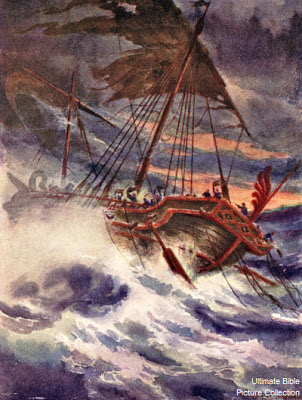
Ac 27 records Paul’s journey to Rome as an appeals prisoner, including a shipwreck. After adverse winds had led them to Fair Havens, Crete, a ship’s council decided to sail on despite danger to reach a better port 40 miles down the coast, despite the hazard and counsels of caution by the Apostle in chains.
A seemingly desirable South wind came up, giving them a reach wind to sail the 40 miles. But then an early Nor’easter struck. By v 20, they had been kept in its grips and were reduced to emergency measures:
Ac 27:20 When neither sun nor stars appeared for many days, and no small tempest lay on us, all hope of our being saved was at last abandoned.
21 Since they had been without food for a long time, Paul stood up among them and said, “Men, you should have listened to me and not have set sail from Crete and incurred this injury and loss. 22 Yet now I urge you to take heart, for there will be no loss of life among you, but only of the ship. 23 For this very night there stood before me an angel of the God to whom I belong and whom I worship, 24 and he said, ‘Do not be afraid, Paul; you must stand before Caesar. And behold, God has granted you all those who sail with you.’ 25 So take heart, men, for I have faith in God that it will be exactly as I have been told. 26 But we must run aground on some island.”
27 When the fourteenth night had come, as we were being driven across the Adriatic Sea, about midnight the sailors suspected that they were nearing land. [ESV]
He had obviously been interceding in prayer, and had an answer at the point of despair. Loss was unavoidable but in mercy life would be granted.
In the face of a time of needless exposure to times of storms for various ships of state mismanaged through imprudence of various kinds, let us hold this in mind. END